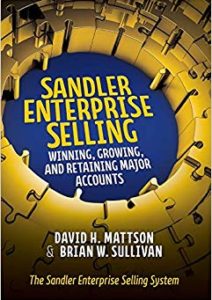While turbulence remains, the major storm has passed. We huddled in basements with our families and rode out the COVID tornado. Figuratively, of course, but perhaps literally on the darkest days. Now, the sun is shining again and we’ve resumed normal selling activities, as best we can. And rightfully so, we’re primarily concerned with our clients and prospects. On this sunny side of the pandemic, we focus on their changed needs and pains. Throughout COVID, we worked diligently to stay connected with our accounts as they adapted, often simply to sustain their basic operations. The international transportation logistics client that generated 80% of their business from the airline industry. Many of their clients like Trans-State, Virgin Australia, Avianca, and Compass disappeared. Gone. And others transformed their models to grow cargo business to supplant lost passenger revenues. Change happened. But as we dwell on the impacts on individual accounts, we must be careful not to neglect the broader picture.
The Clement Stone quote applies. “Since you are a product of your environment, choose the environment that best develops you toward your objective”. But what if your environment changes? Focusing on your pipeline is certainly important. But don’t ignore the environment question. What’s changed with my markets?
I’m not proposing we conduct three-day offsites to dive deeply into our market shifts. I get it. Winning deals now is vital. Not only for us but for our accounts, eager for solutions to address their pains and help them in their recovery. Truthfully, though, such sessions have their merits. But in the interest of time, rapid sales team brainstorming events can be just as productive. And however, you choose to collaborate, by all means, do it. Because strategizing about market changes will not only help future planning but create competitive advantage to help win deals in your pipeline right now.
In sales, we do love our frameworks. So, here’s a simple one identifying five critical market areas for your streamlined brainstorming. Are there other areas? Sure. Do they overlap? Of course. But in the interest of perfect not being the enemy of good, let’s get moving with these:
- Account Base
- Economy
- Service Structure and Deployment
- Market Patterns
- Competition
In selling, it’s all about questions. That’s how we learn. So, let’s consider the most relevant questions in each area. Obviously, yours will be customized to your business but let’s consider some that will matter in any model.
Starting with account base, what about your verticals? We mentioned the airline industry but what about pharma? What’s the impact of Big Pharma morphing from villain to savior? What about the public sector and increases in government funding to serve the greater good? How about traditional retail? Did massive lockdown online ordering deliver the final nail in its coffin? And what about commercial real estate with surplus space and disruptive relocations such as firms abandoning New York for sunny Florida?
And what of the economy? Seasonality may not have impacted your business before but how about now? With temperature impacts on viruses and variants, how will the healthcare economy transition regarding cold versus warm weather seasons? What about SMB with small business grants and the resulting pains and opportunities? With government decrees worldwide greatly impacting local economies, consider the economic limitations on the food service industry and its depressed ecosystem of suppliers. Construction, transportation, and the consumables markets as well. And how will future government decisions about unemployment benefits affect your clients’ workforces and customers?
Regarding service structure and deployment, how effectively positioned are you for the virtual world? It’s here and it’s hungry. How does it affect your business model? Can you sell and deliver remotely? While you may long to return to in-person selling, research shows your buyers feel differently. How about your team selling assets – your SME’s? Including them in key sales calls without travel and expense is the new agility. And what of the impact of seamless virtual alliance, channel, and delivery partnering and the streamlining of contract vehicles? How about your delivery assets – products, services, and people? Can they be a difference-making advantage for you in winning deals?
And market patterns. How have continually changing demographics impacted your clients and prospects? Residential movement out of city centers will dictate change for your accounts. From real estate to residential construction to transportation – they’re all touched. What about the media, advertising, and of course, social platforms? The impact of streaming services and shifting cultural and political patterns – what changes must you act on? And what about your industries’ thought leaders? How many of your healthcare clients, for example, followed Dr. Anthony Fauci eighteen months ago? How about now?
To wrap up, consider the competition and think of the old Indian saying, “In the dark of the night, every cat’s a leopard”. Indeed. And as you ponder, know that many of your competitive leopards’ spots have changed significantly. If you don’t know your current adversaries versus their February 2020 selves, you’ll pay the price. You’ll lose deals and you’ll lose clients. Competitive propositions, people, partnerships, and pricing. Know all the changes.
Gather your teams – the people invested in understanding the changes that truly impact your markets. The people who care and can be depended on to execute on the actions from your brainstorming. Ask the questions. Then face the change, embrace the change and make the change. In selling now, it’s nothing less than a survival skill.











Comments (1)
Even as we navigate through the changing environment, it is important to equip ourselves with tools that help in achieving our organizational objectives.